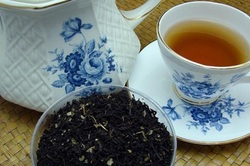 Bergamot a member of the citrus family which is found in the Calabria region of southern Italy. The fruit is a source of essential oils which when added to Earl Grey tea result in the unique scented flavour of this drink. Yesterday national newspapers articles appeared suggesting that Earl Grey tea was as "effective as statins in the fight against heart disease." Is this too good to be true? The newspapers reported a study in rats published in the Journal of Functional Foods. The authors from Italy showed that extract of bergamot fruit reduced cholesterol levels in these animals and that it was as effective as simvastatin. Now if you want to write a story for the newspaper it's only a few steps of logic before you can claim that drinking Earl Grey tea is a possible substitute for a statin. This conclusion goes way beyond the experimental data but some patients I talked to yesterday were clearly ready to give up their statin and try the natural approach. Is there any evidence that bergamot can treat heart disease? Bergamot fruit contains high concentrations of polyphenols. This is usually thought of as a good thing but really we are not sure what these chemicals do. They are in a group called anti-oxidants and since oxidation is bad these chemicals are thought of as good. This is a vast over-simplification of a complex and poorly understood area of biology. The anti-oxidant potential of bergamot is found in other fruits such as pomegranates and blueberries. These are commonly referred to as super-foods in the pages of popular magazines and their beneficial properties are often promoted. There are several human studies reporting potent effects of bergamot extract on cholesterol levels. In one study LDL, or so called bad, cholesterol levels were reduced as much as in people taking 20mg of rosuvastatin. This is very interesting and if reproduced is quite an astounding effect. But wait, what of outcome trials, where is the data that these fruit extracts reduce heart attacks and save lives? Of course this is completely lacking and there will never be any large clinical trials to prove effectiveness in reducing cardiovascular disease. This is because such studies cost millions of pounds and at the end even if it proved effective there is no prospect of a patentable medicine. Doctors usually demand strong evidence before they prescribe drug treatment and this is true in the field of cholesterol lowering drugs or is it? Every year millions of doses of a cholesterol lowering drug called ezetimibe are prescribed for patients intolerant of statins or in whom cholesterol cannot be reduced enough by statins. Ezetimibe definitely lowers cholesterol but is there is scant evidence that it reduces heart attacks or deaths from heart disease. The IMPROVE-IT trial (simvastatin versus a combination of simvastatin/ezetimibe) started years ago and the results are still awaited. Meanwhile doctors continue to prescribe ezetimibe with enthusiasm. Apart from more evidence that it lowers cholesterol there isn’t too much difference between ezetimibe and bergamot fruit extract when it comes to outcome trials. Patients often favour a natural approach but is important to remember that fruit extracts simply contain chemicals and chemicals sometimes have unwanted effects. For example pomegranate juice can interact with drugs like warfarin leading to serious consequences as we previously reported. So where do we go from here? If you enjoy Earl Grey tea continue to enjoy it as a drink but not for its medicinal properties. If you don’t like Earl Grey tea, no problem because there is almost certainly no health benefit in drinking it. If your statin is working, keep taking it. If your statin isn’t working or you are getting unacceptable side effects such as severe muscle aches which have been proven to be due to the statin by a period of withdrawal and re-challenge then you might discuss taking an alternative with your doctor. Whether this involves the recommendation of bergamot extract or ezetimibe is a matter of opinion.
4 Comments
|
Dr Richard BogleThe opinions expressed in this blog are strictly those of the author and should not be construed as the opinion or policy of my employers nor recommendations for your care or anyone else's. Always seek professional guidance instead. Archives
August 2023
Categories
All
|
 RSS Feed
RSS Feed

